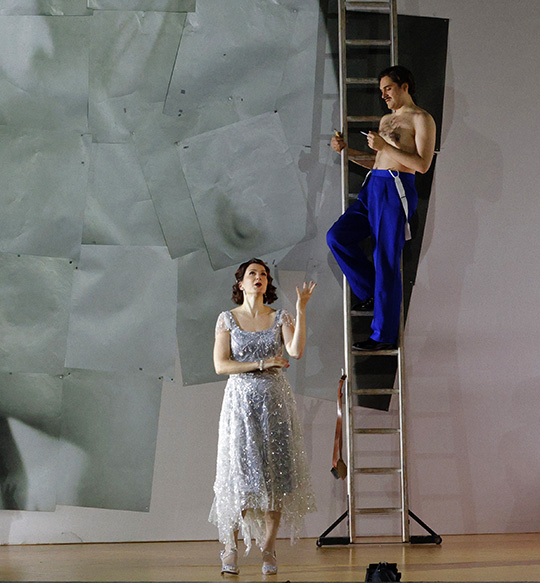The San Francisco Opera is finishing up its summer season with Handel's 1730 Partenope, a three-and-a-half-hour comic romp about the title character being besieged by marriage suitors and the ensuing complications. The six-member cast all sings well and seems to have a real sense of cameraderie onstage, with two star turns by Europeans making their American debuts. Julie Fuchs as Partenope is not only a spectacular singer who makes difficult, ornamented music sound effortless but she is also gorgeously believable as the hostess of a 1920s artistic salon in Paris, where the story has been updated and relocated from ancient Naples by director Christopher Alden. (All production photos are by Cory Weaver.)
Her musical performance is matched note for note by Carlo Vistoli, the Italian countertenor (male soprano) singing Arsace, Prince of Corinth.
The renaissance of Handel operas and other lyric works from the 16th and 17th centuries is a modern phenomenon. Partenope, for instance, had its American premiere in Omaha in 1988, a development which was strangely foreshadowed by the 1979 sci-fi novel On Wings of Song by Thomas Disch. In that book, set in the mid-21st century, the United States has bifurcated into an authoritarian Christian fundamentalist regime in the Midwest and decadent liberal zones along the coast where the rage for castrati singers have made a comeback.
Baritone Hadleigh Adams (top left, with Julie Fuchs in the center)) sings Ormonte and it was lovely to have his lower register balancing out the many soprano voices in the opera. It was never quite clear in this staging who his character was supposed to be, but in compensation he did get to wear the most amusing costumes of the evening. Mezzo-soprano Daniela Mack (top right) was Rosmira, Princess of Cyprus, who spends 95% of the opera disguised as a man. She has tracked down Arsace after he jilted her at the altar and makes life hell for him over the course of the opera.
There is another suitor, Emilio, Prince of Cumae, who in the original libretto arrives with an army to reinforce his betrothal bid. In this version, he is based on the artist Man Ray, running around taking lots of photographs. Director Christopher Alden has a great visual sense but his concept productions don't usually make much sense, and Partenope is no exception. Instead of a battle scene between the forces of Partenope and Emilio that are clearly depicted in the Act Two musical score, there is instead just a lot of confusion. Tenor Alek Shrader, seen here with Daniela Mack in drag, nonetheless did a fine job playing the surrealist artist.
There is yet another countertenor suitor, Nicholas Tamagna, singing Armindo, Prince of Rhodes, and he was delightfully piquant as the shy, recessive guy who eventually wins the girl.
The final scene sets up a duel between Arsace and Rosmina in male drag, but the altercation is stopped when Arsace takes off his shirt to fight and demands that Rosmina do the same. Her disguise is revealed and instead of trying to kill each other, they kiss and get married instead.
Between the swift, fabulous conducting of Christopher Moulds and the superlative cast, this production is a diva worshiper's treasure, and I have a few friends who have seen it repeatedly. Chenier Ng, above left, was seeing this production for the third time, and posted this selfie with Carlo Vistoli at the stage door after this Tuesday's performance. There is one more chance to attend this Friday the 28th, and since you probably won't have many more chances to see Partenope in this lifetime , it's highly recommended.









3 comments:
That photo of Shrader and Mack makes me wonder whether an intimacy coach would have been required if they weren't married to each other.
Loved the opera, which I also saw Tuesday, and loved your review. It helped me make sense of what I saw. Sitting in very top row of top balcony I mostly listened and couldn't see very well. A splendid evening nonetheless.
Thank you so much for this touching track and the time you spent on it 🙌 گیتا و حمیرا ای ساربان ای کاروان {وای چه غروب تنگیه دلم گرفته}
Post a Comment